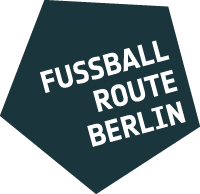3:10Olympiastadion
Olympischer Platz
Football was forced into line under the Nazi dictatorship.
Beginning in 1935 a cup competition based on the English model was held in Germany. The trophy was named after Hans von Tschammer und Osten, at the time the head of the National Socialist Association for Physical Exercises, which was the umbrella organization under which the Nazi regime had brought all sports into line since 1933. After the annexation of Austria in March 1938, the Austrian clubs were also compelled to participate in the German competitions. In January 1939, SK Rapid Vienna scored 3:1 against the FSV Frankfurt and won the cup in the final match in Berlin‘s Olympic stadium. A few months after that match, Germany’s attack on Poland set off the Second World War.
Additional topics on the information board
- 1936 Olympic Games
- “Wartime Cup games”
- 1944 Cup final
Hertha BSC: One of the founding members of the Bundesliga.
As midfield maestro and key player of Hertha BSC in the 1970s, Erich “Ete” Beer scored 83 goals in a total of 253 Bundesliga matches between 1971 and 1979 and contributed significantly to the club’s successes. In 1974/75, Hertha was runner-up, and in 1977 and 1979 it advanced to the DFB Cup finals. Though Hertha BSC advanced to the UEFA Cup semifinals in 1979, in the next season after that the team dropped down to the German second league, and years of further decline followed. National coach Helmut Schön drafted Beer to play in 24 matches with the national team. Among other matches, Beer played in the final match of the 1976 European Championship, which the team, then the DFB all-star team, lost to Czechoslovakia on penalties.
Additional topics on the information board
- Hertha BSC in the Bundesliga
- Berlin’s football clubs in the Bundesliga
- Exhibition game between Hertha and Union in 1990
- Hertha amateurs in the DFB Cup final
With the addition of the “German Wembley,” the city has one more attraction.
Since 1985 the Olympic stadium has been the site of the DFB Cup finals. In its bid for the 1988 UEFA Football Championship the German Football Association (DFB) wanted to avoid political obstacles, and therefore the association decided early on to back away from designating Berlin as the championship venue because internationally opinions on whether or not Berlin was part of the Federal Republic of Germany differed. In return, the DFB decided to hold its cup finals in Berlin for at least five consecutive years. “Berlin, Berlin, we’re going to Berlin” became the rallying cry of football fans all over the country. In 1985, Bayer 05 Uerdingen was the first team to win the cup in the “German Wembley.” In subsequent years, interest in this event has grown to such an extent that fans order their tickets way in advance and regardless of which teams play in the final match. Thus, the city has an additional attraction to offer, and every year it proves itself a genial host to fans.
Additional topics on the information board
- DFB Cup final of the women’s league
- Olympic stadium hosts social highlights of the season
Student football matches between England and Germany have been held annually since 1956; until the 1990s they took place alternately in London and Berlin. After the English club had been restructured, the teams broke with tradition, and the German team for a while played against several different opponents. Since 2007 the team has had a constant opponent again, namely, the French team.
Plakat vom Schülerländerspiel 2013
The World Cup is a grand social event.
The 2006 FIFA World Cup in Deutschland will go down in history as the year of the “summer’s tale.” During the championship the country proved itself a genial and cosmopolitan host — surprising even many Germans — and greatly enhanced goodwill and benevolence toward Germany all over the world. In a white-knuckle match against Argentina, the DFB all-star team won the quarter-finals on penalties, but in the semifinals the team lost to the future World Cup holder. In the final match in the Olympic stadium the teams from Italy and France were lined up against each other. At the end of normal time and overtime the score was still 1:1; finally, Italy came off victorious on penalties. One of the many positive outcomes of the World Cup games in Germany is the increased social acceptance of football has since found in Germany.
Additional topics on the information board
- Exhibition game between Turkey and Germany in 1951
- Football World Cup 1974
- Hertha’s 1999 Champions League game played in thick fog
- Women’s Football World Cup in 2011











